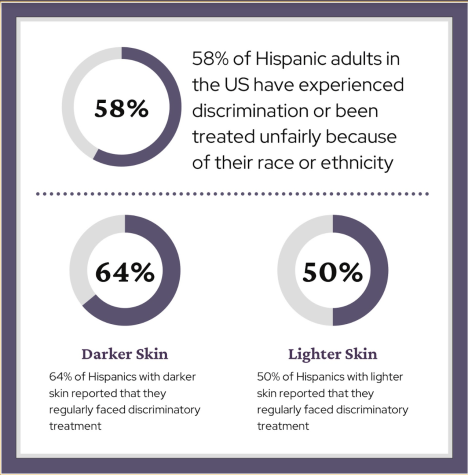Social issues complicate relationships to the Latinx identity
June 2, 2022
According to a 2019 report by Pew Research, over 58% of Hispanic adults in the US say that “they have experienced discrimination or been treated unfairly because of their race or ethnicity,” a statistic that varies in proportion with the darkness of a person’s skin color.
Mistreatment may entail racial slurs, jokes, belittlement or threats to personal security, as reported by the participants in the survey. Such discrimination happens too close for comfort — in California, and even to some members of the Harker community.
Fifty percent of Hispanics with lighter skin reported that they faced discriminatory treatment “regularly” or “from time to time,” compared with 64% of those with darker skin. Joanna, who describes herself as “white-passing,” acknowledges the benefits of her lighter skin tone.

“[Being white-passing] has made it so I can connect with my culture without ever having to worry about a stranger commenting on it,” Joanna said. “It’s something that I am fortunate that I’m never going to have to deal with because I get white privilege. It’s made it a lot easier for me to connect to my culture because I know that I’m never gonna have to deal with the barrier of society, [but] I feel for a lot of people who have to deal with it.”
Sara’s family recently requested an appointment at the veterinarian for their ill dog. When her father spotted a nurse and asked for assistance, the nurse rebuffed him, incorrectly assuming a language barrier was present.
“My dad has a pretty clear accent, but you can understand him,” Sara said. “The nurse that we were talking to was acting like she couldn’t understand him, and he was being very clear. He was like ‘No, no, I’m speaking English’ because then she started saying, ‘Do you speak Spanish? Would you like me to talk to you in a different language?’ I think he felt uncomfortable.”